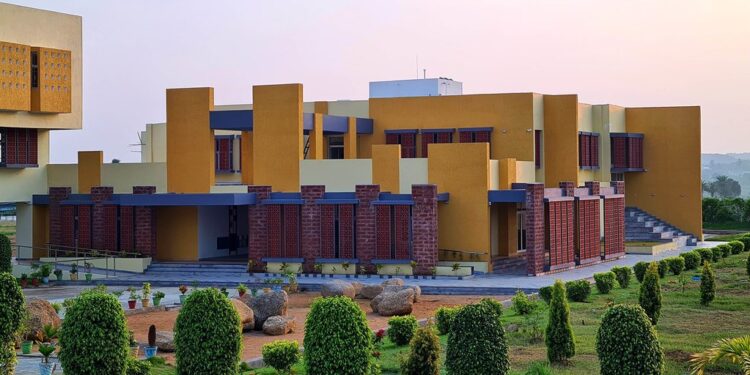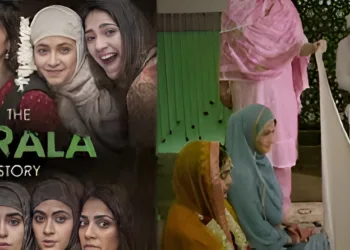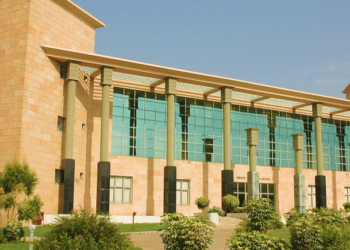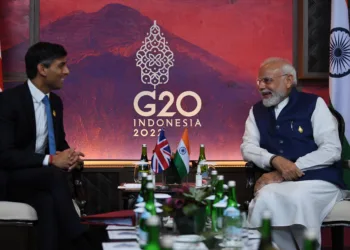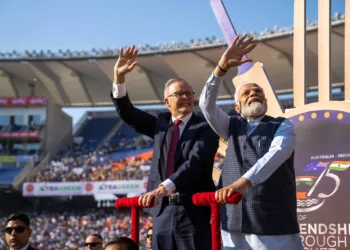BY KALYAN BANERJEE
An inspiring tale of a school in Odisha where children pursue their interests and enjoy their childhood through playful learning experiences in a fear-free environment. The school focuses on curiosity and motivation, besides connecting students with the community
The Klorofeel School project was a painstakingly nurtured dream that began with a stutter and a hiccup at the outset. We received the formal approval to start the school on March 16, 2020, but were then hit by the 68-day lockdown, leaving “online” as the only option for us. We walked the razor’s edge, balancing our conviction about minimising screen time for children with the need to engage them. We also recognised that all parents did not have a laptop or a spare phone for the child.
The initial “classes” consisted of half an hour of video conversing with each student, three times a week. Grouping students into classes happened months later. This allowed us to know each child personally, and students became comfortable with their teachers. Slowly, we increased it to three hours a day as the year progressed.
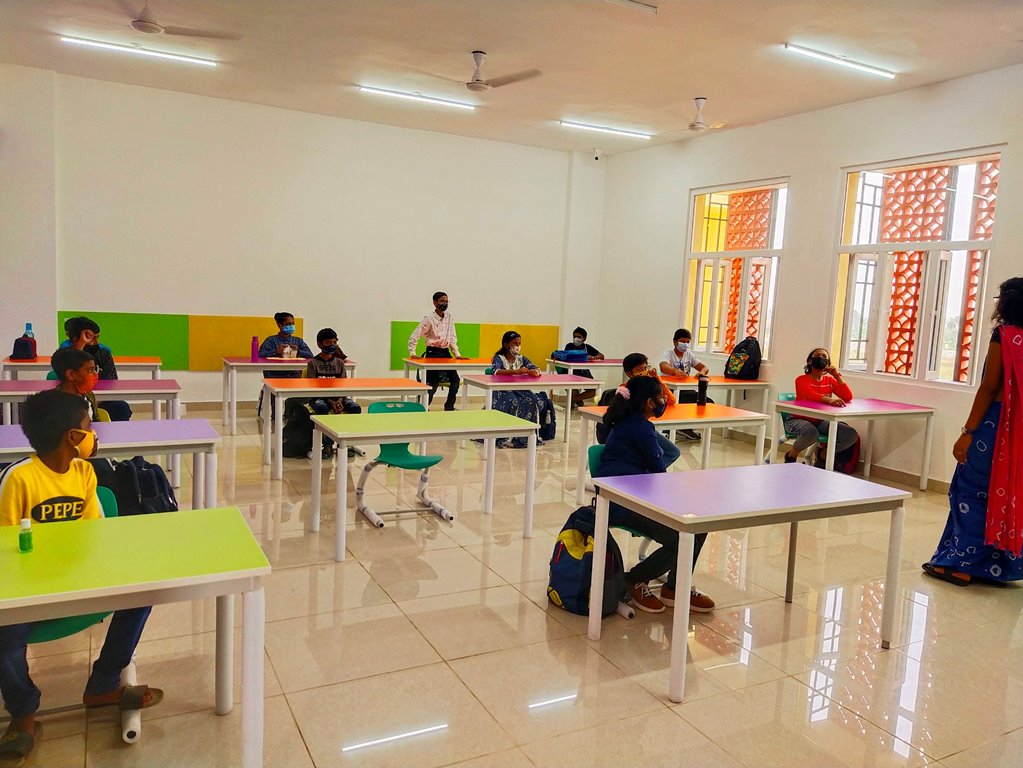
Anand Rao Ladi had been my colleague in MindTree since February 2000, and he had shared his dream of starting a school in Brahmapur. Repeated conversations stay etched in memory even when we do not act. Anand had grown up in Brahmapur, Odisha where his primary school headmistress had advised him to go to Bhubaneswar and study in the Sainik School; so he studied there from Class VI onwards. He was very happy with the education he received at Sainik School, but was separated from family, parents, sisters, and younger brother, and he recalls how painful that was. Children should have access to quality education without having to leave home, he reasoned.
Anand was also inspired by Pilani, by how an unknown village grew into a world-renowned centre of educational excellence. Could Brahmapur be a similar education hub for the country?
As for me, exploring learning and motivation interested me deeply and I had experimented with these in my professional life at Wipro R&D and MindTree. After I chose to leave the industry and joined a university (2012-15), I was trying to figure out how to motivate students. I explored how to teach, how to inspire. Many of my methods (e.g. competitions, e-learning, peer learning, near peer learning, group incentives) failed. This forced me to delve deeper and try new approaches in a new context; my beliefs evolved and I gained new insights.
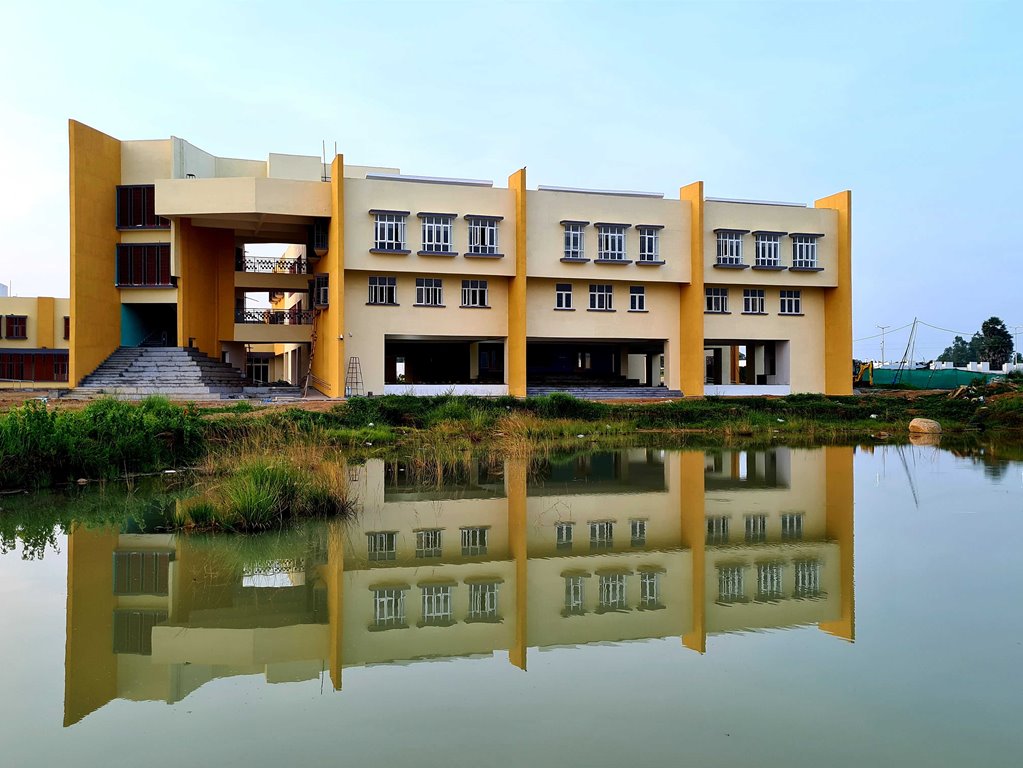
While I wrestled with how education should be, my new friend, Dr Haribandhu Panda, steadily grew as an influence on me through our multitude of conversations that centred around society, equity, social values and what we could do to influence the future of society. A mechanical engineer from Regional Engineering College (REC), Rourkela, Haribandhu had begun his career with the National Thermal Power Corporation (NTPC) before getting a Ph.D. from the Asian Institute of Technology (Bangkok). Later, as one of the founding faculty at the Institute of Rural Management Anand (IRMA), he spent significant years working with Dr Verghese Kurien (of Amul fame). He felt we must focus on schooling in less addressed parts of the country.
I felt teaching children was a difficult art, and I did not have the capability. Soon, destiny plotted a spontaneous, inspired conversation with Haribandhu and a committed social worker from Bissamcuttack (in southern Odisha, 50 km from Rayagada). The discussion centred around education in deprived areas, leading to initiating10 Learning Centres with 300 children in 10 villages. Bissamcuttack, being among the less addressed regions in our country, became a natural choice. Our design for Bissamcuttack included parent participation, community support and the need to work with local teachers. Love for children and willingness to learn are more relevant than formal qualifications, we decided. We selected 13 teachers after a rigorous week-long workshop.
Still, in my mind, we were not ready to launch a school yet. Destiny intervened once more, leading me to reconnect with Anand and his dream of a school in Brahmapur. The two dreams merged to conceive the Klorofeel School at Brahmapur. We needed to create a school where children pursued their interests and enjoyed their childhood with playful learning experiences in a fear-free environment, which would lead to choosing the career of their dreams.
Our school would focus on curiosity and motivation, a variety of channels for learning, connecting with the community and providing diverse exposure.
It was important that it should not be an island of excellence – it must engage with other schools, teachers, and the environment around. And if we were to influence society, not just students, we knew we must focus on teachers, parents and the community as well. The learning institution we created must have a mission beyond the school and its children.
At Klorofeel School, we believe parents are the first teachers of the child, and education at Klorofeel is in collaboration with parents, not outsourced. Even as our school started, we came out with a book, Purposeful Parenting, disseminating our views. Our students would also connect with the community around us, and the highs and lows of the society we were in. Together, we would grow. This would remain a driving principle as we progressed.
We traded screen time for plenty of activity for the child at home. We discovered that the kitchen is a wonderful laboratory of learning. Apart from the cooking itself, it has a variety of vessels of different shapes and sizes, and diverse food items measured in different units – grammes, kilogrammes and litres, for example.
They learned how much water was used and where – and how to reduce usage. Students drew their family trees and needed to learn about the lives of their grandparents and other family members when they were children. Such activities increased the engagement within the family, and we were privileged to get an insider’s perspective. This aligned with our principle that parents and school must work together towards the child’s learning.
Puzzles sent out and solved through WhatsApp groups became popular. Quizzes were a regular feature, and children looked forward to them. We discovered our children were good at drawing and craft work, they now possess an impressive array of art they have created. When an artist from Visva Bharati joined us as our fine arts teacher, it enhanced their quality. Early on, an innovative drama teacher joined us to create learning experiences through theatre. He collaborated with other teachers to integrate theatre into regular teaching, and lessons were joyous and the learning “sticky”.
Children in cities like Bengaluru or Mumbai enjoy an advantage because of the wider exposure they receive. We are committed to creating rich exposure for our children. This year, through Zoom, our children have interacted with Wing Commander S.K. Patel, listened to Prof. Kaushik Basu (former chief economist at the World Bank), enjoyed a guided virtual tour of the National Gallery of Modern Art (NGMA), and learned science with Brahmanand Swain (with his karke dekho mode of teaching) and Samar Bagchi, reputed for teaching with experiments. They have learnt civic responsibility from reputed public problem-solving organisation Reap Benefit, and learned thinking and design with their New York-based robotics coach, Dr Duri Sastry.
Quizzing to learn is now synonymous with Klorofeel School. Similarly, learning mathematics and English through puzzles has become a norm. We have a goal: students must read 20 books a year. There’s a Toy Library for younger children, and a Lab at Home kit to do science experiments at home, something we ourselves could not do as children.
The “Near to Far” learning philosophy leads to a strong grounding in local heritage and culture. Last year’s calendar featured 12 festivals of Odisha, a visual treat chosen from our students’ drawings. After the pandemic, their experience would be richer as the environment opens up, with the many learning excursions we are unable to have now, apart from an expansive campus that lies unused.
Our campus spans 14.5 acres with two buildings, one for regular classes, and the larger one, Curiosity Centre, for labs, dance, music and all else. There’s plenty of opportunity for classes outside the classroom; an open-air amphitheatre and an indoor auditorium. Post-pandemic, students will benefit from a Living Lab where they can grow their own plant in their own plot, a weather station, and a telescope for sky gazing.
It is our aspiration to not just build a school but impact education in the region. We dream of Brahmapur emerging as a learning hub for the nation – our concepts on parenting, connecting with community, experiential learning and fear-free environment are principles that must impact education beyond our region. The investment in infrastructure is triggered by this thought, with the ambition of showcasing learning principles critical to meaningful education. On a contiguous plot, residential and visitors’ quarters are being built to attract aspiring teachers, fellows, and educationists.
Klorofeel School has been born in difficult times. Our hundred students, their parents, and a score of teachers have shown faith – and we have been learning together, innovating to navigate unanticipated obstacles. The concept of meaningful learning and inspired children in a fear-free environment finding purpose even as we stay connected with society, must be shown to succeed, and grow.
Klorofeel School is founded by Dr Haribandhu Panda, Anand Rao Ladi, Kalyan Banerjee and Dr Adarsh Rath. It began its first academic session in March 2020.


